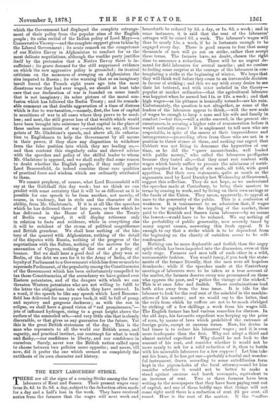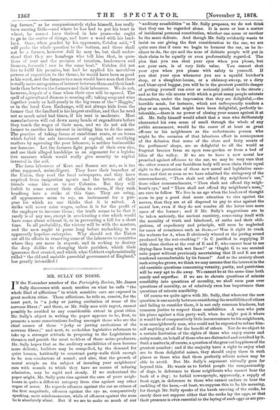THE KENT LABOURERS' STRIKE.
THERE are all the signs of a coming Strike among the farm labourers of Kent and Sussex. Their present wages vary from 26.4d. to 2s. 9d. a day, subject to the deduction often made for a day and a hall's loss in the week. They have received notice from the farmers that the wages will next week and henceforth be reduced by 3d. a day, or is, 6d. a week ; and in some instances, it is said that the rent of the labourers' cottages will be raised 6d. a week. The labourer's wages will thus be nearly 15s. a week, if he is fortunate enough to be engaged every day. There is good reason to fear that many thousands of men will go out on strike, rather than accept these terms. The farmers have, no doubt, chosen the right time to announce a reduction. There will be no urgent de- mand for field labourers for several months ; and we confess to feeling some surprise at the courage of the labourers in con- templating a strike at the beginning of winter. We hope that they will think well before they come to an irrevocable decision in favour of striking ; and this we say with every desire to see their lot bettered, and with utter unbelief in the theory— popular at market ordinaries—that the agricultural labourer was happiest when he earned but 1 is. or 12s. a week ; and that high wages—as his pittance is ironically termed—are his ruin. Unfortunately, the question is not altogether, as some of the leaders of the labourers appear to think,—will the new scale of wages be enough to keep a man and his wife and family in comfort ?—but this,—will a strike succeed, in the present cir- cumstances, in securing a higher rate of remuneration before it would naturally come ? It is unpleasant to tell men who are respectable, in spite of the sneers at their improvidence and intemperance—proceeding often from those who are not in a position to throw stones at them, and making one regret that Cobbett was not living to denounce the hypocrites of our time, as he did the "queer mountebanks, well loaded with public money," who called the labourers profligates because they tasted ale,—that they must rest content with wages which barely suffice to procure the minimum of nutri- ment required for a family of six souls, all told, with good appetites. But their own statements, quite as much as the arguments used by Lord Darnley last Wednesday at Gravesend, suggest this reflection. They do not hope, as we understand the speeches made at Canterbury, to bring their masters to terms by ceasing to work, and by living on their own savings or the funds of the Union. They mean, apparently, to appeal at once to the generosity of the public. This is a confession of weakness. It is tantamount to an admission that, if wages were to be regulated by the higgling of the market, those paid to the Kentish and Sussex farm labourer—by no means the lowest—would have to be reduced. We say nothing of the probability of public generosity, now severely taxed by many urgent causes, answering this fresh appeal. It is enough to say that a strike which is to be dependent from the beginning on the charity of outsiders seems to be self- condemned.
Nothing can be more deplorable and foolish than the angry spirit which has been imported into the discussion, even at this early stage. Farmers and men talk of each other in a wild, unreasonable fashion. You would fancy, if you took the state- ments of the former literally, that the men were all hopeless drunkards ; while if the speeches made at the Canterbury meetings of labourers were to be taken as a true account of the matter, the farmers deserve every woe pronounced on those who oppress the poor, and "gather the vintage of the wicked." This is at once false and foolish. These recriminations lead both sides away from the true issue. It is idle for the labourer to look for the real root of the mischief in the machin- ations of his master ; and we would say to the latter, that the evils from which he suffers are not to be much abridged by striking off a few shillings a week from his wages bill. The English farmer has had various remedies for distress. In the old days, his favourite expedient was keeping up the price of corn, by means of laws which prohibited the entrance of foreign grain, except at onerous terms. Now, his device in bad times is to reduce his labourers' wages ; and it is even more inadequate than the first. Why not adopt a third and almost untried expedient ? Why should he not look to the amount of his rent, and consider whether it would not be more manly to ask for a solid reduction of it, than to battle with his miserable labourers for a. few coppers ? Let him take out his lease, if he has got one—probably a fearful and wonder- ful instrument, drawn according to some antediluvian form kept in the pigeon-holes of the local attorney—and let him consider whether it would not be better to make a stand against onerous and harsh covenants, equivalent to
an increase of rent. Two or three farmers have been writing to the newspapers that they have been paying rent out of capital, and one of them boldly says that things will not come right until there is a reduction of rent 25 per cent. all round. Here is the root of the matter. If the "suffer- ing farmer," as he compassionately styles himself, has really been earning little—and where he has had to put his trust in wheat, he cannot have thrived in late years—he ought to go to the centre of things, and have a word with his land- lord. Once, when goaded by his opponents, Cobden said, "I will probe the whole question to the bottom, and there shall not be a farmer, however dull he may be, but shall under- stand that they are humbugs who tell him that, in ques- tions of rent and the revision of taxation, landowners and farmers, forsooth ! row in the same boat." Cobden did not live to fulfil his promise, but had he applied his matchless powers of exposition to the theme, he would have been as good as his word, and the farmers to a man would have seen that there is really more antagonism of interest between them and their land- lords than between the farmers and their labourers. We do not, however, despair of a time when their eyes will be opened. The spell of agricultural dinners is wearing off; taking soup and wine together yearly or half-yearly in the big room of the 'Magpie," or in the local Corn Exchange, will not always hide from the farmer that the landlord is his largest creditor, and that he need not so much mind bad times, if his rent is moderate. Most manufacturers will cut down many heads of expenditure before they touch the wages of their men, and we do not ask the farmer to sacrifice his interest in inviting him to do the same. The practice of taking farms at exorbitant rents, or on terms which forbid the safe investment of capital, and rectifying matters by squeezing the poor labourer, is neither businesslike nor humane. Let the farmers fight people of their own size, and use their alleged hardships as an argument for a legisla- tive measure which would really give security to capital invested in the soil.
The farm labourers of Kent and Sussex are not, as is too often supposed, unintelligent. They have their branches of the Union, they read the local newspapers, and they have acquired from emigration agents and the letters of their friends some idea as to our Colonies. But they will forfeit to some extent their claim to esteem, if they rush headlong into a strike at this time. They are using, all appearances seem to say, an instrument for a pur- pose for which no one thinks that it is suited. A strike will never raise wages, unless it is for the profit of the employer to increase them ; the truth seems to be that it rarely is of any use, except in accelerating a rise which would have come about without it, or in preventing a fall for a short time. In all probability, the victory will be with the masters, and the men ought to pause long before embarking in an apparently hopeless enterprise. Why should not the Union use all its efforts in removing some of the labourers to countries where they are more in request, and in seeking to destroy the deep dislike to changing their parishes, which their ignorance first created, and which what Cobbett euphemistically called " the old and amiable parochial government of England," has greatly intensified ?



































 Previous page
Previous page